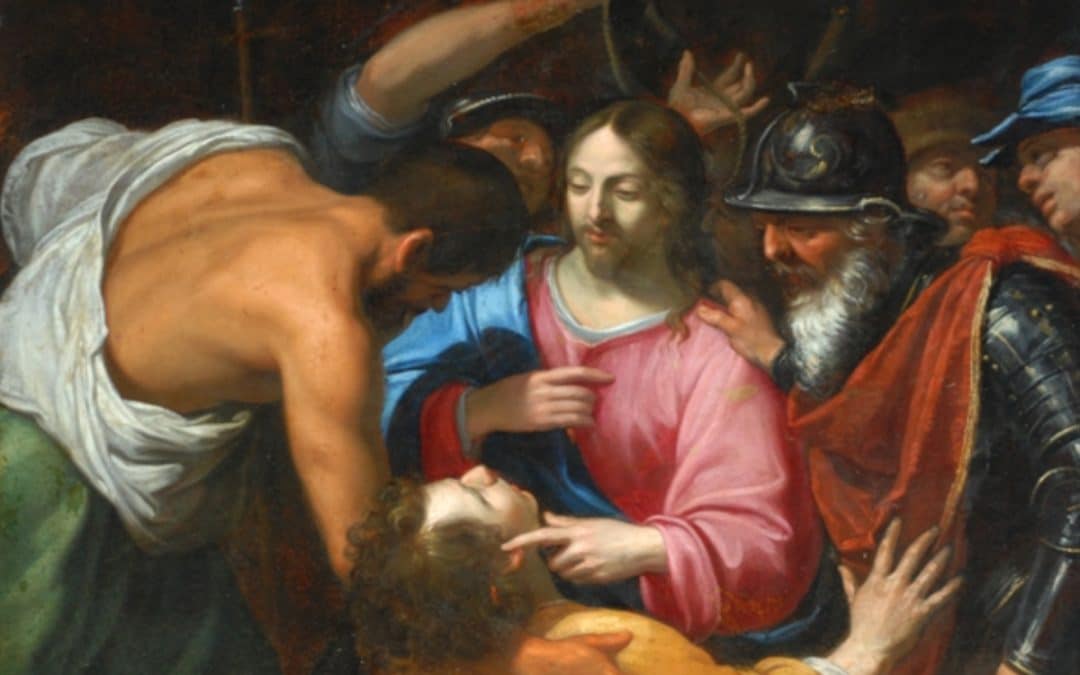Jesus’ Last Miracle
If you could perform one miracle, what would it be?
Last things are most important. Farewell words. The dying man’s final request. Deathbed confessions. A last will and testament. A final miracle in the face of death. Can you recall Jesus’ last miracle? Most people can’t. Yet, it may be his most important—if you want to cross generational divides to forge the future.
So, do you remember his last miracle? Spoiler alert! Jesus was in the Garden of Gethsemane. The religious authorities had sent a troop of temple security guards to arrest him. Among them was a servant of the Jewish High Priest. John 18:10 identifies him as Malchus. After Judas marked Jesus with a kiss, rough hands reached out to bind him with ropes. A melee of shouting, shoving, and scuffling ensued. Peter pulled out a sword and swung it wildly, barely missing Malchus’ head—but chopping off his ear.
We can imagine the shock and searing pain that Malchus experienced. As he touched the stump where an ear had been, he surely realized that he would bear this hideous deformity for the remainder of his days. To his surprise, the Galilean rabbi rebuked his assailant. Then he picked up the ear and reattached it—unbloodied, unscathed, and as good as new. Malchus must have felt both bewilderment and amazement that his sworn enemy could show him such kindness. This was Jesus’ last miracle before his death, and maybe the one that is most significant for us.
If you were able to perform one miracle, what would it be? If given the opportunity to perform one last act of kindness, what would you do? May I suggest that, in these polarized and toxic times, you should do exactly what Jesus did in an age not unlike our own. I see three things.
First of all, Jesus didn’t duke it out with the opposition. When the temple security guys showed up with swords, Peter decided to pull his out too. It wasn’t a fair fight. These were professionals, trained in the art of wielding swords. Peter was a fisherman, unskilled in swordsmanship. He swung for the head and lopped off an ear. Like Peter, Jesus calls us to be fishers of people, not back alley brawlers. It’s no wonder Jesus quickly rebuked his hot-headed disciple: “Put your sword away! He who lives by the sword will die by the sword.” [Matt. 26:52]
Jesus said that people will hate his followers in the same way they hated him. [John 15:18] So, how do we respond when enemies of the Gospel come against us? By remembering two biblical dictums: “Our struggle is not against flesh and blood…but against spiritual forces in heavenly places.” [Eph. 6:12]. As a result, “The weapons of our warfare are not carnal…” [2 Cor. 10:4] Our sword is the Word of God. Our power is in the Holy Spirit who is summoned by our prayers.
The sad history of the Church is that Jesus’ disciples too often turn to the tactics of this world, thinking that they can go toe-to-toe like a fisherman against temple paramilitary men. Our Enemy is better skilled than we in the art of carnal warfare like nagging, guilt-manipulation, screaming, shouting, accusing, Machiavellian politics, protesting, electioneering, Supreme Court stacking, and all the other things we Evangelicals do to change culture. Conservative politics won’t defeat the enemies of the Gospel. Endless hours of self-medicating by listening to commentators on Cable TV or talk radio won’t change our country’s direction. So, if you had the time to do one last thing, or a few final acts that might bring healing, what would you do?
Secondly, Jesus fixed a disciple’s mistake. Peter was sincerely trying to help his Master, but he messed up big time. He thought that he could protect our Lord from being nailed to a cross. But Jesus replied, “Shall I not drink the cup that my Father has given me?” [John 18:11] Our Lord was willing to obey his heavenly Father, even though it meant the most horrifying death possible. His disciples wanted Jesus on a throne, not a cross. Often, we think we have a better plan for our lives than God does. Inevitably, our sword-swinging ends badly—not only for us, but for our families, and even our nonbelieving neighbors. Before we Evangelicals can change our world, the Lord has to fix our mistaken ideas and actions. Our wandering children and grandchildren will not return to the Church until they see us behaving more like the Christ of the Gospels.
In the third place, Jesus healed an enemy. Make no mistake about it: Malchus was our Lord’s sworn enemy. He had come to arrest this rabble-rousing rabbi who was a clear and present danger to his beloved temple. But Jesus didn’t scream at him, fight back, or try like Peter to hurt him. Instead, he healed him. After that, the man with a new ear fades into obscurity. There is no historical evidence of what happened to Malchus after that miracle. And yet, he was remembered years later when the Gospels were written. I’d like to think that he became one of Jesus’ followers after the Resurrection. But this much is sure: by healing rather that hurting our enemies, the Gospel is best advanced.
If you still have the time to do some last things for your children, grandchildren, loved ones, neighbors, and enemies, start by avoiding carnal warfare. Keep your swords sheathed. Instead, fix your own mistakes. Then help fix the mistakes of Jesus’ disciples in the Church. Finally, bring healing to those who are not yet disciples of Jesus—and even those who stand against him! That’s what Joyce and I plan to do with the time we have left.
Dr. Bob Petterson
Legacy Imperative

